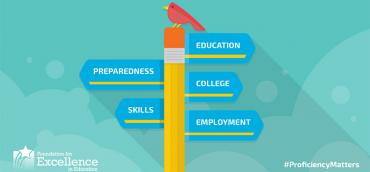
Every year, in every state, students’ academic progress is measured by standardized assessment tests. While the goal of statewide and national assessment tests can vary widely, how are parents and educators supposed to know if their children and students are really prepared for what lies beyond the classroom?
In order to help parents better understand what actually makes a student “proficient” -- or whether or not a student has actually demonstrated mastery of a specific subject -- the Foundation For Excellence in Education has debuted WhyProficiencyMatters.com, a website which aims to help parents understand the difference between statewide proficiency tests and national proficiency tests.
Students who have demonstrated proficiency are able to apply those skills to real-life situations, and thus tend to be better qualified for jobs after they leave school.
But proficiency expectations vary by state and differ widely on a national scale by the National Assessment of Educational Progress (NAEP) proficiency expectations. This discrepancy in expectations is called a “proficiency gap.”
According to WhyProficiencyMatters, states with large proficiency gaps set the bar too low. When the bar is too low, parents and teachers believe students are performing better than they actually are.
Florida has made great strides in education throughout the years, but a comparison between results on the statewide assessment test and NAEP scores shows the state has a 20-point gap between the two assessments, ranking 12th out of all 50 states in the report.
That can be problematic for Florida students who want to continue on to higher education since less than 20 percent of 2014 ACT-tested high school graduates were college-ready in all English, reading, math, and science benchmarks. On top of that, nearly 70,000 Florida freshmen students entering two-year colleges require remedial classes.
Raising proficiency expectations, the foundation says, will help set a higher bar for greater academic achievement for Florida’s students -- and give them better opportunities later on in life.
"Florida leaders must raise their proficiency expectations if they hope to create an education system where every child masters the knowledge and skills necessary to be successful in the next grade -- and most importantly -- after high school,” said Patricia Levesque, CEO for the Foundation for Excellence in Education.
"Achieving proficiency ensures every student graduates prepared for success in college, a career or the military," Levesque explained. "Yet, because of low expectations, all children are not equally prepared for the challenges of college or today's workforce. Our education systems must raise proficiency expectations to ensure every child masters essential knowledge and skills."
That’s where the foundation’s new website steps in -- by illustrating the discrepancies between statewide assessments and NAEP results, the group can raise awareness so states can set the bar higher and higher.
Policy expert Dr. Christy Hovanetz told Sunshine State News the states which performed the best -- New York and Wisconsin -- have aligned their tests to the NAEP assessment which is why they ranked so highly.
“There are a lot of states that have done a lot of good work to align their [assessments] to proficiency scores for [NAEP], but there are other states that are higher performing because they’ve increased their rigor and success,” she explained.
Hovanetz said Florida has risen to the challenge in the past -- and history will repeat itself in Florida as long as the awareness and push to help students achieve more is present.
“There is an extra opportunity to be able to set those expectations even higher again,” she said when discussing Florida’s past education reforms. “Florida has [always] been good at raising the bar.”
Reach Tampa-based reporter Allison Neilsen by email at allison@sunshinestatemews.com or follow her on Twitter: @AllisonNielsen


